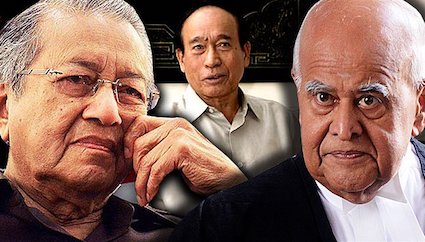

Retired judge tells forum Federal Constitution was amended in 1988 after former AG Abu Talib Othman allegedly complained that judges interfered in his work.
(FMT) – A retired judge has alleged that Dr Mahathir Mohamad and former attorney-general (AG) Abu Talib Othman were behind the amendment to the Federal Constitution in 1988, which removed the judicial power of the courts.
Gopal Sri Ram said this came about after the then Supreme Court ruled in the case of Public Prosecutor v Yap Peng that the AG, who is also the public prosecutor, could not at his discretion apply to transfer criminal cases for trial.
In 1987, the apex court in a majority 3-2 ruling held that the public prosecutor’s move to use Section 418A of the Criminal Procedure Code was against Article 121 (1).
The majority held that the power to transfer cases was an exercise of judicial power.
Sri Ram, who represented Yap Peng in the trial, alleged Talib had informed the government that he could not function as “judges were giving him a lot of problems and the solution was to introduce legislation”.
He said the government then organised a series of highly-charged road shows for about four to five months to inform the public that the judiciary had no business to interfere with the powers of the AG.
“As a result, Article 121 (1) was the first in a series of Mahathir’s amendments in 1988.
“It has nothing to do with the 1988 judicial crisis where three Supreme Court judges were removed from office. It has to do with the ego of two men,” he said at a forum yesterday on Judicial Independence and Separation of Powers titled, “A New Hope in Light of Semenyih Jaya?”
Sri Ram said the Federal Court ruling in Semenyih Jaya that stated the 1988 amendment to check the powers of the judiciary was contrary to the basic structure of the supreme law of the land, was a courageous decision.
However, he said the judgment fell short of striking down Article 121 (1) as unconstitutional.
“It is like the Indian football team who dribble the ball beautifully but gives it to the goalkeeper,” said Sri Ram who became a judge in 1994.
Justice Zainun Ali, who delivered the landmark ruling on April 20, said the amendment undermined the principle of separation of powers and independence of the judiciary.
“With the removal of judicial power from inherent jurisdiction of the judiciary, that institution was effectively suborned to Parliament, with the implication that Parliament became sovereign,” Zainun had ruled.
In her 85-page judgment, she said the result was manifestly inconsistent with the supremacy of the constitution as enshrined in Article 4(1).
This ruling had also departed from a majority apex court decision in 2008 which gave a narrow interpretation to Article 121 (1) that the superior court derived its power from Parliament.
Meanwhile, another speaker at the forum, lawyer Malik Imtiaz Sarwar said he was of the opinion that the recent court ruling had declared Article 121 (1) as unconstitutional.
“Four paragraphs in the judgment is explicit in declaring that the 1988 amendment is void,” he said.



No comments:
Post a Comment
Note: Only a member of this blog may post a comment.